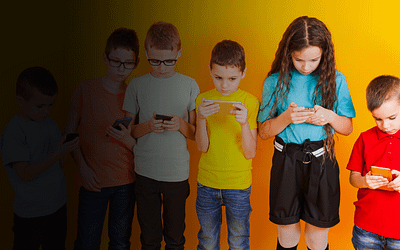It’s incredible to believe that there is now a whole generation that has never had a childhood without technology. It is all they have known. We grew up in a society where, when you got bored, you played with your hair or doodled. When the streetlights came on at night, that was the sign it was time to go home. But not this generation. They have had their childhood abducted from them.

Growing up is hard. We as adults have all been through it. Yet these days, we also have to factor in the influence of technology and how your peers know everything there is about you. It is recorded forever. Gone are the days you could slam your door shut or take the phone off the hook to get some privacy and space. These days, kids are 24/7 “connected” with their friends. They don’t have the chance to take time away from their peers or roam the streets on new adventures. And it’s making a huge impact on how they interact with the world. Downtime is so important for them to be able to process the emotions and experiences that they have been through. Heck, we all need it. However, as kids and teens, they don’t yet understand the emotions going through their bodies or how to cope with them.
The unfortunate outcome of this is that teen depression, anxiety, and suicide are steadily on the rise. By the time they turn 18, nearly three-quarters of Melbourne teens have experienced severe levels of anxiety or depression (Herald Sun). Suicide is the leading cause of death in teens and young adults (Suicide Programs). This isn’t just a statistic; it’s a tragic reality that underscores the urgency of addressing this issue.
When we talk about the “abducted childhood,” we’re not just pointing fingers at technology itself. It’s about the culture that has allowed technology to seep into every crevice of our lives without restraint. Think about it: when was the last time your child or teen spent a full day disconnected from screens? Many of us can’t even remember. It’s not just their time and attention that have been hijacked, but their ability to experience the world organically, to make mistakes without a digital footprint, and to discover who they are away from the pressures of online validation.
This is a hard topic to discuss because (and as a parent myself) it highlights where we have let our children down. We have unknowingly let their childhood be abducted. I mean, you’d never let this kind of thing happen under your watch. Yet we have. And it’s not entirely our fault as we are just as addicted to this technology as our kids. But we can take control of our lives and that of our children. Awareness is the first step toward change.
The Role of Parents in Reclaiming Childhood
As parents, it’s easy to feel helpless in the face of such a pervasive issue. But there are tangible steps we can take to help our children reclaim their childhoods. First, we need to model the behaviour we wish to see. If we’re constantly checking our phones, scrolling social media, or replying to emails at the dinner table, we’re sending the message that screens are more important than human connection. By setting boundaries for ourselves, we can demonstrate the value of being present in the moment.
Many teens are openly lamenting the childhood they never had. So let us listen to their cries and help them to find that childhood. Let us stand up for their rights as they do not have a voice that is heard. Let us put in place boundaries so that they can understand what it means to live offline. Let’s put the family home phone back in the kitchen so that they can be contacted but aren’t tethered to their devices 24/7. Give them a mobile that has no internet. They don’t need to be in constant contact with their friends, especially not when they’re supposed to be resting in their beds.
Children learn about the world through play, exploration, and unstructured time. But today’s youth are often over-scheduled with school, activities and glued to screens during their free time. This lack of spontaneous play has serious consequences for their creativity, problem-solving skills, and mental health. As parents, we can encourage more outdoor play, introduce them to hobbies that don’t involve screens, and even join them in activities like biking, hiking, or playing board games. It’s about showing them that the offline world has just as much to offer—if not more—than the digital one.
Another critical aspect of reclaiming childhood is fostering real-world connections. Our interactions are incredibly different offline than online. What you might feel brave enough to type, may not feel appropriate to say. Encourage your children to spend time with friends in person rather than relying on group chats or video calls. Host gatherings where screens are left at the door and conversations flow freely. Create opportunities for your kids to connect with family members, neighbours, and their broader community. Real relationships are built on shared experiences, eye contact, and heartfelt conversations—not on likes and comments.
Finally, let’s talk about the importance of downtime. In a world that glorifies busyness and constant connectivity, it’s easy to overlook the value of simply doing nothing. But downtime allows children to process their emotions, recharge their energy, and engage in self-reflection. Whether it’s reading a book, staring at the clouds, or just sitting quietly, these moments of stillness are crucial for their mental and emotional well-being, and to find out who they are.
Making change is hard, especially when you are forcing someone to do something they don’t want to do. Because, let’s face it, they have an addiction. We all have an addiction to our phones. It’s important as parents to do what is right for our children and not let the masses sway our decisions. We wouldn’t let our kids be addicted to anything else, so why are we making allowances for their phones?
It’s time.
Our children have the right to a childhood. A real one, filled with adventures, laughter, scraped knees, and memories that aren’t measured in pixels or hashtags. We, as parents and guardians, have the power to give it to them. It won’t be easy, and it won’t happen overnight. But every small step we take—whether it’s setting screen-time limits, encouraging outdoor play, or simply putting our own phones down—brings us closer to reclaiming what’s been lost.
The abducted childhood can be rescued. It starts with us.
Join one of our workshops or have a look at our resources for more ideas on how you can help your kids, or contact us for one on one coaching to ease the transition to a balanced and fufilled offline life. Talk to your school about having The Good Vibe Theory school programme to give kids the knowledge they need to navigate tech in their lives.
More on the blog
Australia’s Social Media Ban: Is It Enough?
Imagine a world where kids under 16 are no longer endlessly scrolling TikTok, posting selfies on Instagram, or arguing over who’s "liked" whose post. It sounds like a breath of fresh air, doesn’t it? In a landmark move, the Australian Government has stepped up to the...
Replace phone addiction with Good Vibes
We’ve all been there—mindlessly scrolling through our phones, looking for something, anything, to spark a bit of joy. But instead of finding inspiration, we end up feeling drained, disconnected, and a little more distant from what truly matters. What if, instead of...
The “Connection” Addiction
Are we more connected than ever—or just addicted to the idea of connection? Picture this: you’re out for dinner with friends. The food is delicious, the atmosphere is cozy, and the conversation should be flowing. But instead of laughing together, you’re all staring at...



